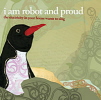 I'd champion this as the emo-heavy electronic album of 2006 if it weren't deserving of just slightly more praise than that. Shaw-Han Lien composes ultra-busy synthetic pop songs using the same old four-on-the-floor rhythm tracks and toppling sound banks made popular by disco and techno performers, but he adds his own extra-processed spice to the music, making it almost enjoyable. It is simultaneously bright, sunny, and altogether sickening.
I'd champion this as the emo-heavy electronic album of 2006 if it weren't deserving of just slightly more praise than that. Shaw-Han Lien composes ultra-busy synthetic pop songs using the same old four-on-the-floor rhythm tracks and toppling sound banks made popular by disco and techno performers, but he adds his own extra-processed spice to the music, making it almost enjoyable. It is simultaneously bright, sunny, and altogether sickening.
Darla
The album art and song titles should've been enough to alert me that something was wrong. I should've figured that I was meant to cry or run in a field of sunflowers to really appreciate this record because that's exactly the mood it exudes in gallons upon gallons of far to happy, way too optimistic synthetic joy. Keyboards, drum machines, various programs, and all manner of heavily edited melodic lines jerk and twitch with an energy that might be appropriate for someone on ecstasy, but for me they radiate a corniness that suggests Shaw-Han isn't paying enough attention. When the songs aren't too happy, they're catchy numbers that last just long enough to make sitting through the next smiling ray of sunshine nearly worth it.
What Shaw-Han does have going for him is an immediately evident familiarity with the instruments and programs he uses. The vibrancy that pours out of his hands are the result of careful study and preparation, a desire to fuse every instrument together into one great instrument capable of taking any influence and running with it. At times, when Shaw-Han lays off the altogether too imposing sense of emotional gushing, his arrangements stand out as being great examples of how technology can really bring together a variety of ideas, places, influences, and thoughts without sacrificing any of the particular qualities inherent in each.
For example, Shaw-Han's music sounds as though it is without geography; it is not distinctly European, nor does it bare any of the familiar qualities of English electronic music popularized by Aphex Twin or Autechre, and it isn't quite crazy enough to bare the seal of the Japanese electronic underground. This is a huge plus, sometimes enough to make sure I only skip a few tracks on the disc. On the songs I enjoy the most I get the feeling that Shaw-Han not only listens to a lot of music, but knows where each bit of music fits in with another. "Save Your Neck, Save Your Brother" features a soft flute part that weaves in and out of horns, strings, and electronic warmth and sounds simultaneously like Eastern spiritual music and gentle, pastoral idleness as envisioned by Four Tet. Its effortless grace gives it a sparkling quality and is among the two or three outstanding songs on the album.
Every time I listen to the entire album, however, I feel less like this album is something I can connect with: its skipping, merry compositions are sometimes far too close to video game music. Much of this could be thrown onto a children's television show and used while the end credits roll; nobody would notice because it is that innocuous. As soon as I feel that disconnect and lose touch with the album, it doesn't matter how talented Shaw-Han is, he's lost me for good. A final complaint comes in the almost monotone delivery of many of these songs. After a little while many of them sound the same because they are all very busy, very rhythmic, very structured tracks that don't ever stretch, breathe, or really live at all. In all the detail Shaw-Han lost sight of the big picture and thus lost me somewhere in all the rubbery bass parts and sparkling chimes.
I suspect I'll be hearing much more of Shaw-Han's work, I only hope that the next time I hear him, I won't immediately thing of large purple dinosaurs, cuddly animals, or cartoons marching side by side with the world's sickest grin on their faces. The Electricity in You House Wants to Sing is currently available through Darla mail-order, but will be more widely available on the 20th of March.
samples:
Read More

